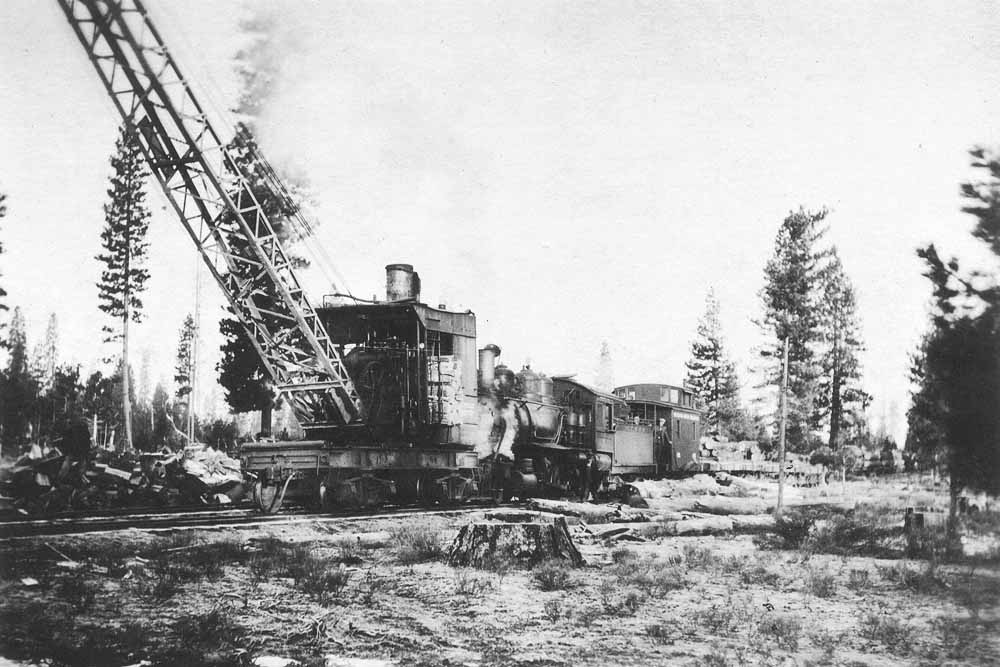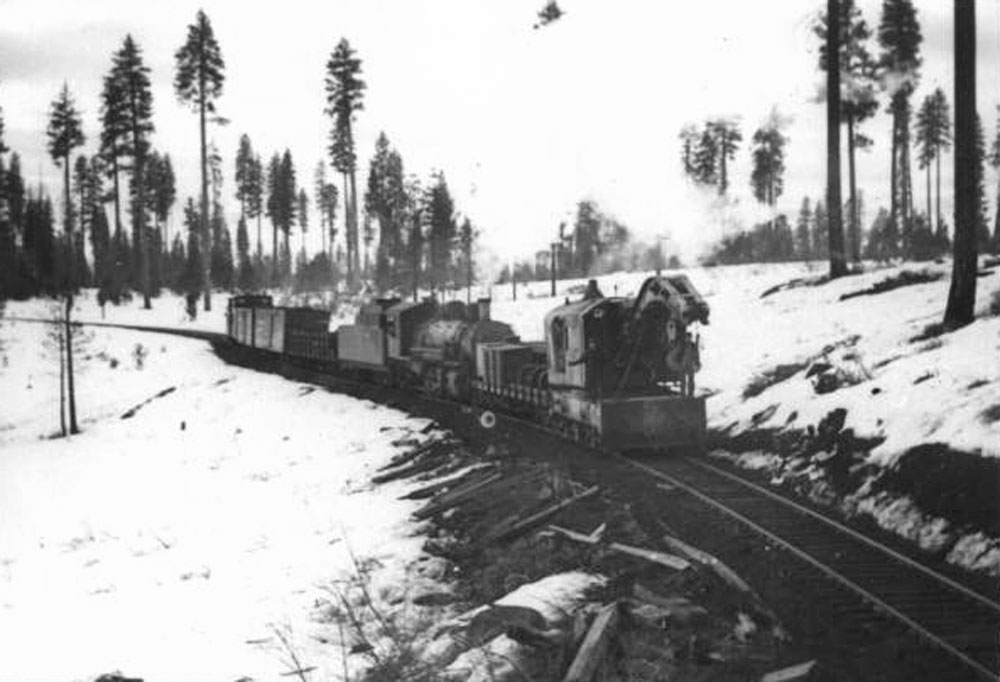|
McCloud River Railroad
Equipment Roster Cranes |
|
|

|
Brownhoist crane #15 being pushed by locomotive #4. Pacific Northwest Virtual Logging Data Center.
|
|
Cranes are an indispensable piece of equipment around railroads, especially those tied to the
logging industry. The McCloud companies used their cranes for many chores around the property,
including cleaning up wrecks, loading logs, track construction and maintenance, construction
activities, and almost anything else involving lifting or moving large objects. Most of the cranes during the steam era were along with the McGiffert loaders and its crew transport vehicles the only large pieces of railroad equipment the lumber company owned, as it leased all other equipment from the railroad. Underlined numbers are clickable links to a photo page of that car. 8- Industrial Brownhoist Special Industrial Logging Crane, owned by McCloud River Lumber Company, purchased circa 1929. Largest of the early cranes on the property, had side rods on the trucks. Scrapped sometime in the 1950s, though boom remains on the ground at Ash Creek Junction. 15/ MR 72- Brownhoist crane, purchased by the McCloud River Lumber Company prior to 1917. Early design, with boiler offset to the back right corner of the cab. Converted from steam to diesel power in the late 1940s/early 1950s, with original arch bar trucks replaced with Bettendorf trucks. Also appears to have swapped booms with the #16, perhaps at the time of the rebuild. Sold to U.S. Plywood, who in 3/1964 resold it to McCloud River Railroad for $500. Railroad painted it in April 1964, cost $80.71 for labor and $85.82 for paint, and renumbered it MR 72. Conveyed to Great Western Railway Museum around 1987. Stored in McCloud 1988-2010, then purchased at auction by owner of land it rested on. Scrapped fall 2010. 16-Brownhoist crane, purchased by the McCloud River Lumber Company prior in 1925 or 1926. Later crane design, with boiler centered in the back of the cab. Never converted from steam power. Conveyed to McCloud River Railroad, though never entered into equipment roster and almost certainly never used by the railroad. Stored derelict at Ash Creek Junction until scrapped in the late 1980s. 70- Orton locomotive crane, purchased from the U.S. Navy in late 1963. Cost $11,700. Operated in Navy gray until repainted orange by the early 1970s, then repainted brown to match the new diesel paint in the early 1980s. Sold to McCloud Railway 1992. Remains in storage in McCloud today. 71- Burro crane, purchased used circa 1986, though the railroad continued making payments at least through 1991. Sold 1992 to McCloud Railway in 1992. Replaced by a Hy-Rail Crane in 1993 and sold to the Willamette & Pacific Railroad, where it served until scrapped by the late 1990s. 1765- Derrick, converted by McCloud car shop from flat car #25. Work order issued 6/10/1910, car completed 8/1910. Cost $1,941.92 ($363.76 labor, $1578.16 materials). Featured an 8-horsepower Union gasoline powered windlass and double drum winch. Retired 9/1934. 1851:2- Burro model 30 crane, serial number 106. Purchased 2/1954 from A.D. Schader Co. Cost $8,188.50. Equipped with 35-foot boom and purchased complete with extra boom, dipper stick, and one-half yard bucket. In 6/1958 the shops completed a general overhaul, including overhauling propelling clutch, shaft, and assembly; replacing old gears, bearings, bearing seals, and bearing mounts; overhaul vertical center propelling shaft assembly; machine and fit air equipment passing through vertical center propelling shaft; check bottom travel shaft and bearings; weld leaks in oil pan; and install battery. Fitted with the shovel boom 3/1959 for cut and fill widening work on the Bear Flat to Ditch Creek part of the line, then changed back to a normal boom in time to receive 500 feet of new 1/2" cable on 8/30/1962. Survived on the railroad until deeded 5/1988 to the Great Western Railway Museum as part of a lawsuit settlement. Stored in McCloud 1988-2010, then purchased at auction by owner of land it rested on. Scrapped fall 2010. In addition to the above, the railroad leased cranes- primarily wrecking cranes- from the Southern Pacific or Great Northern companies as needed to clean up derailments. 
A leased Southern Pacific wrecking crane arriving at the scene of a derailment. Heritage Junction Museum.
|
|
|
|
|